I am trying to create public base64 key from RSA Private key using Security framework. Here is snippet.
let tag = "com.example.keys.mykey"
public extension SecKey {
static func generateBase64Encoded2048BitRSAKey() throws -> (private: String, public: String) {
let type = kSecAttrKeyTypeRSA
let attributes: [String: Any] =
[kSecAttrKeyType as String: type,
kSecAttrKeySizeInBits as String: 2048
]
var error: Unmanaged<CFError>?
guard let key = SecKeyCreateRandomKey(attributes as CFDictionary, &error),
let data = SecKeyCopyExternalRepresentation(key, &error) as Data?,
let publicKey = SecKeyCopyPublicKey(key),
let publicKeyData = SecKeyCopyExternalRepresentation(publicKey, &error) as Data? else {
throw error!.takeRetainedValue() as Error
}
return (private: data.base64EncodedString(), public: publicKeyData.base64EncodedString())
}
}
do {
let (pvtKey, pubKey) = try SecKey.generateBase64Encoded2048BitRSAKey()
print(pubKey)
} catch let error {
print(error)
}
This is the output
MIIBCgKCAQEA1ZafTYboquQbCTZMEb1IqHKIr8wiDjdn6e0toRajZCQo9W5zuTlEuctrjJJQ08HcOuK3BPFRaFTUP1RBFvnba/T2S1Mc6WVX81b0DmKS8aPJ83TvvQlH3bZjVqFzndXJHJatcXRkZKlbidNQYxV9OYFCRLwgR5PBoJ1P5tp8f8735vIADOBL/93nFywODSjAWLXcyG5tUyRlRGX7eDodL7jqVOFxVMB7K9UOJehPuJQiheykyPSbBSLE6raZbpCHlranTLdihWYFs2tYbxzNrVbXzgKIxDDjrhDLVFvo3beudKQcLQkSO+m2LJIDT91zAnxVQ075AIn80ZHh5kdyQQIDAQAB
But this public key is not getting accepted by our Java server. It is throwing exception for the same.
Here is java snippet
public static void main(String[] args) {
String pubKey = "MIIBCgKCAQEA1ZafTYboquQbCTZMEb1IqHKIr8wiDjdn6e0toRajZCQo9W5zuTlEuctrjJJQ08HcOuK3BPFRaFTUP1RBFvnba/T2S1Mc6WVX81b0DmKS8aPJ83TvvQlH3bZjVqFzndXJHJatcXRkZKlbidNQYxV9OYFCRLwgR5PBoJ1P5tp8f8735vIADOBL/93nFywODSjAWLXcyG5tUyRlRGX7eDodL7jqVOFxVMB7K9UOJehPuJQiheykyPSbBSLE6raZbpCHlranTLdihWYFs2tYbxzNrVbXzgKIxDDjrhDLVFvo3beudKQcLQkSO+m2LJIDT91zAnxVQ075AIn80ZHh5kdyQQIDAQAB";
PublicKey key = getPublic(pubKey);
}
public static PublicKey getPublic(String key) {
PublicKey pbKey = null;
try {
byte[] keyBytes = Base64.getDecoder().decode(key);
System.out.println(keyBytes.length);
X509EncodedKeySpec spec = new X509EncodedKeySpec(keyBytes);
KeyFactory factory = KeyFactory.getInstance("RSA");
pbKey = factory.generatePublic(spec);
} catch (Exception e) {
e.printStackTrace();
}
return pbKey;
}
Here is the exception
java.security.spec.InvalidKeySpecException: java.security.InvalidKeyException: IOException: algid parse error, not a sequence
at sun.security.rsa.RSAKeyFactory.engineGeneratePublic(RSAKeyFactory.java:205)
at java.security.KeyFactory.generatePublic(KeyFactory.java:334)
at Main.getPublic(Main.java:40)
at Main.main(Main.java:28)
But the online PEM parser website - https://8gwifi.org/PemParserFunctions.jsp is accepting this public key, which is using bouncycastle library in the background to validate this base64 encoded public key.
